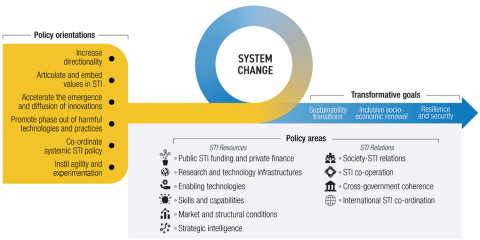Transformative innovation policies: key learnings

The Interreg Europe Policy Learning Platform organised an online discussion on transformative innovation policies on Tuesday 10 September 2024.
Interreg Europe projects leading transformative changes
The online discussion brought together 15 participants representing Interreg Europe projects such as ORIGINN, LOTTI, CHERRY, CODIL, DEBUTING, OD4GROWTH, EMBRAISME, REWARD, and PROACTSME. Participants demonstrated proactive engagement, sharing concrete examples of implementing transformative, place-based innovation policies. These examples highlighted the involvement of key stakeholders and partners in fostering local development, promoting open innovation, and addressing societal and green transition challenges.
The emergence of transformative innovation policies
The rise of societal grand challenges—such as the COVID-19 pandemic, digital transformation, climate change, energy efficiency, biodiversity loss, an ageing population, and pollution—requires transformative changes that extend beyond research and innovation. These changes must also encompass institutional, social, and organisational shifts toward inclusiveness and sustainability (Uyarra et al.).
Consequently, innovation policies have evolved from the linear models focused on economic growth in the 1960s, to national innovation systems aimed at competitiveness in the 1990s, to the most recent approaches oriented toward transformative changes.
Innovation must not blindly follow the logic of competitiveness but should respond to broader regional and societal challenges, serving as an intermediate step towards the longer-term goals of fostering sustainability and inclusiveness (McCann and Soete).
This shift towards transformative changes presents policymakers with novel challenges, as they must now consider not only how and how much innovation is needed but also key issues of directionality, legitimacy, and responsibility (Schlaile et al.).
In other words, innovation requires policymakers to address not just the means (which policies) but also fundamental questions of directionality (what future do we want), legitimacy (why do we want this future, and who defines it), and responsibility (transformation by and for whom).
Transformative innovation policies imply that regional policymakers must experiment with new policies to stimulate socio-technical transitions and develop innovative institutional solutions to change the direction of existing R&D and innovation activities (TIPC).
These policies are systemic and experimental, generating feedback loops between invention, innovation, and use, as well as ongoing interactions among actors, networks, institutions, and technologies.
Transformative change policies involve experimentation across a broad spectrum of contexts and directionality (TIPC).

Innovation for place-based transformations
The Joint Research Centre (JRC) provides support for local and regional policymakers aiming to design and implement transformative innovation policies through the Partnerships for Regional Innovation (PRI).
The Partnerships for Regional Innovation (PRI) represent a new approach to place-based innovation policy, building on positive experiences with smart specialisation strategies.
In January 2024, the JRC published the ACTIONbook, a comprehensive hands-on resource that offers practices and tools to empower local, regional, and national stakeholders across Europe to drive societal well-being and climate-resilient development.
Building on the experience of the Partnerships for Regional Innovation (PRI) and the ACTIONbook, the JRC announced the launch of the EU Preparatory Action (PA) on Innovation for Place-Based Transformations. Running from 2024 to 2026, this Action will offer a combination of awareness-raising, capacity-building, and experimentation activities to all interested territories in EU Member States and EU Associated Countries. Its aim is to facilitate and promote transformative innovation approaches across the participating territories and inspire further collaboration.
Participation in the PA will be based on a call for Expressions of Interest, which is expected to launch in October 2024.
Experimenting with transformative innovation policies
The Government of Cantabria and the Scientific and Technological Park of Cantabria have launched an ambitious new initiative: the Xtela project. This challenge-driven startup acceleration program connects business challenges from large companies in Cantabria, aligned with regional S3 priorities, to innovative solutions from startups.
Xtela builds upon Cantabria’s Innovation Strategy 2016-2030 and the Smart Specialisation Strategy 2021-2027, targeting sectors such as Industry 4.0, blue economy, bioeconomy, health and well-being, and sustainable cultural and tourism industries. Unlike many regional innovation policies, this initiative begins with a specific challenge. It represents a significant advance in the challenge-driven innovation approach, specifically designed to tackle concrete business challenges in Cantabria.





